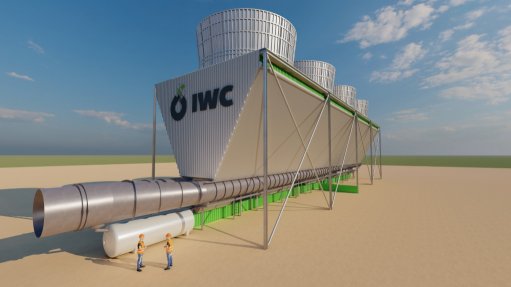
COOL AS A CUCUMBER According to thermal solutions specialist Industrial Water Coolin air-cooled condensers are the most efficient, green option for cooling
After two successful webinars that unpacked the use of air-cooled condensers (ACC) for recoverable energy in power generation, thermal solutions specialist Industrial Water Cooling (IWC) aims to address future clients and investors at this year’s Enlit Africa 2024, which will be held at the Cape Town International Convention Centre from May 21 to 23.
According to IWC, the ACC technology, incorporating partial evaporative cooling, can play a transformative role in harnessing recoverable energy and using it for power generation.
The discussion being hosted by IWC consulting and research and development manager Professor Hanno Reuter will take place at the Generation, Transmission and Distribution Knowledge Hub on May 22.
“IWC has, through collective input from its clients and industry leaders, fine-tuned its technologies, which I will be highlighting at Enlit,” he says.
An important message that must be conveyed is that even though integrating a condenser system into an existing plant is cost effective and seamless, the benefits of doing so in the planning stages of a new power plant are exponentially greater.
He adds that, as this eliminates the need to design and work around existing infrastructure, a new installation is more viable.
“We have learned from interactions last year at the Enlit and built on that information to present a better, more efficient and less costly product this year.”
During a webinar hosted by Creamer Media in October 2023, Reuter stressed that the combination of recoverable, renewable and conventional energy power generation is an optimal solution for power generation globally.
He added that recoverable energy power generation was the cleanest and most economical form of power generation, with little to no emissions.
Additionally, compared with traditional wet-cooling towers with a boiler design that matches an ACC – with similar parameters, including having the same fuel consumption and greenhouse-gas emissions – the ACC uses virtually no water, as opposed to the 1.5 ℓ/kWh to 2.5 ℓ/kWh of water typically used by cooling towers, however the ACC results in up to 20% less power output.
Therefore, optimising the thermal power generation also boosts the energy efficiency of the system while increasing the uptake of recoverable energy, he notes.
In the Air
Reuter tells Engineering News that IWC has also developed a new system which drives plume abatement.
“Plumes are often thought to be an eyesore and many people assume that the plume is pollution ladened, despite this not being the case.”
The plume is merely a vapour column, or steam, being released from the cooling process, he adds.
Nevertheless, having the ability to harness this plume and reintroduce it within a power plant bolsters its cogeneration capacity.
“Through all of these systems, a plant can decrease its expenditure, increase its profit margins and also address its footprint in the transition to net-zero emissions,” Reuter concludes.